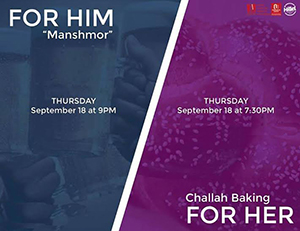
A Look at Gendered Jewish Experiences
I was scrolling through Facebook when a friend sent me a screenshot of an OU/JLIC Jewish event at a secular college campus. “Manshmor” for him (i.e. Learning Torah and drinking beer) and challah baking for her. I was incensed. Let me get this straight–learning Torah is for men, and baking is for women? Is this actually a big deal? What if you say let’s support equality, but why do we need to get rid of traditional roles? In the words of one of my colleagues, Sarah Notis, a student at Rensselaer Polytechnic Institute ‘16, “the traditional roles mean that women are not invited to take part in the activity involving higher-level cognition and deeper understanding of our tradition, and men are not invited to take part in the activity involving tactile and experiential connection to our tradition.”
To say this is just JLIC would be lying. In fact, these gendered Jewish experiences have followed me, and many Jewish students throughout their whole lives. From middle school, when young men are introduced to Gemara and young women stick to Tanach. Where women do arts and crafts and men play sports. In high school, where men are viewed by how much they’ve learned and women are viewed by how modestly they dress. In Israeli yeshiva and seminary, where men are encouraged to stay up all night learning and women are encouraged to talk about their feelings.
In sectors of Orthodoxy, women are excluded from the most basic things that tie them to their tradition. Namely, equal textual education, inherently Jewish external signifiers, ritual participation, clergy roles, agency in marriage and divorce proceedings, the list unfortunately goes on.
How long will Orthodoxy play this game? Orthodox women have PHDs and many are as professionally successful as their men counterparts. When will we start taking them seriously and expect equal interest in learning? And if in fact there is something to traditional women’s activities, why are we denying men this access? This only further propagates traditional macho man stereotypes, and denies and isolates men who would prefer more traditionally female activities.
Rivka Hia is an intern at JLBC. She is a junior at Stern College majoring in journalism. Find out more at: about.me/Rivka.
By Rivka Hia










